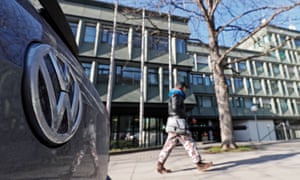EU gives car manufacturers 10 weeks to respond to findings from antitrust investigation

VW, Daimler and BMW could face fines of up to 10% of their global annual turnover.
Photograph: Ronald Wittek/EPA
The European commission has charged BMW, Daimler and Volkswagen with colluding to limit the introduction of clean emissions technology, in the preliminary findings of an antitrust investigation.
The car manufacturers have 10 weeks to respond and could face fines of billions of euros – up to 10% of their global annual turnover – if their explanations are rejected.
A similar cartel case the commission took out in 2014 against MAN, Volvo/Renault, Daimler, Iveco and DAF ended with €2.93bn (£2.53bn) of penalties being levied.
The EU’s competition commissioner, Margrethe Vestager, said: “Companies can cooperate in many ways to improve the quality of their products. However, EU competition rules do not allow them to collude on exactly the opposite: not to improve their products, not to compete on quality.”
She added: “Daimler, VW and BMW may have broken EU competition rules. As a result, European consumers may have been denied the opportunity to buy cars with the best available technology.”
The EU announcement follows raids on the auto manufacturers in July 2017 after allegations in Der Spiegel that they had met in secret working groups in the 1990s to coordinate a response to diesel emissions limits.
Between 2006 and 2014, the commission suspects that the “circle of five” carmakers – including VW’s Audi and Porsche divisions – colluded to limit, delay or avoid the introduction of selective catalytic reduction systems (SCRs) and “Otto” particle filters.
The SCR systems are used to reduce toxic diesel emissions of nitrogen dioxide, which were responsible for the premature deaths of more than 14,000 Britons in 2012, according to the EU’s environment agency.
The Otto filters are supposed to control exhaust gases from petrol passenger cars and limit particulate emissions, which are associated with tens of thousands of deaths a year.
William Todts, the executive director of the European Federation of Transport and Environment, said: “It would be indefensible if the German car industry colluded to fit useless emissions controls, as the allegations indicate. That would mean Europeans were breathing poisonous air that should have been avoided. The EU must fine colluding companies but it mustn’t stop there. We need to clean up the 43m dirty diesels that are on our streets today.”
News of the investigation’s early findings will be a blow to the automobile industry after the 2015 Dieselgate scandal, in which VW was exposed for cheating EU emissions tests.
Nicolai Laude, VW’s litigation director, stressed that the EU’s investigation was limited to conduct relating to emissions controls systems. He said: “The commission acknowledges the fact that cooperation between manufacturers on technical issues is widespread in the global automotive industry.
“Volkswagen will examine the complaints and issue a statement after evaluating the investigation file as part of its cooperation.”
A statement by BMW confirmed only that the company had received “a so-called statement of objections from the European commission”.
Daimler, which alerted the regulator to the alleged collusion, said it did not expect to be fined as a result of its information.